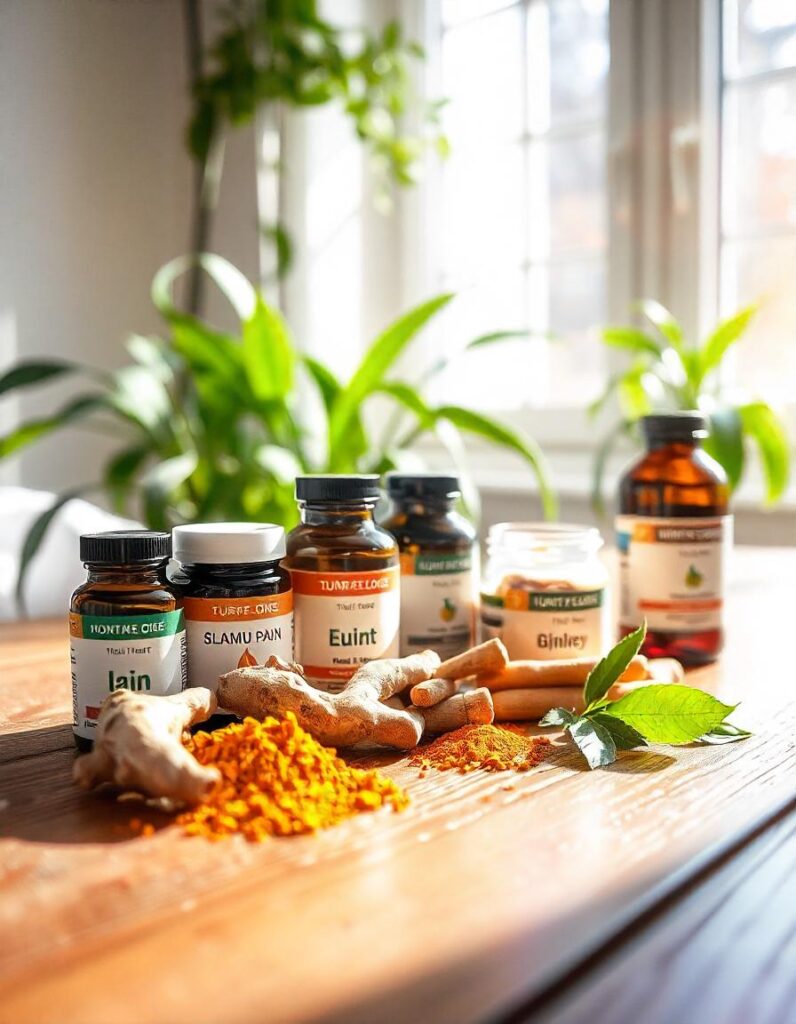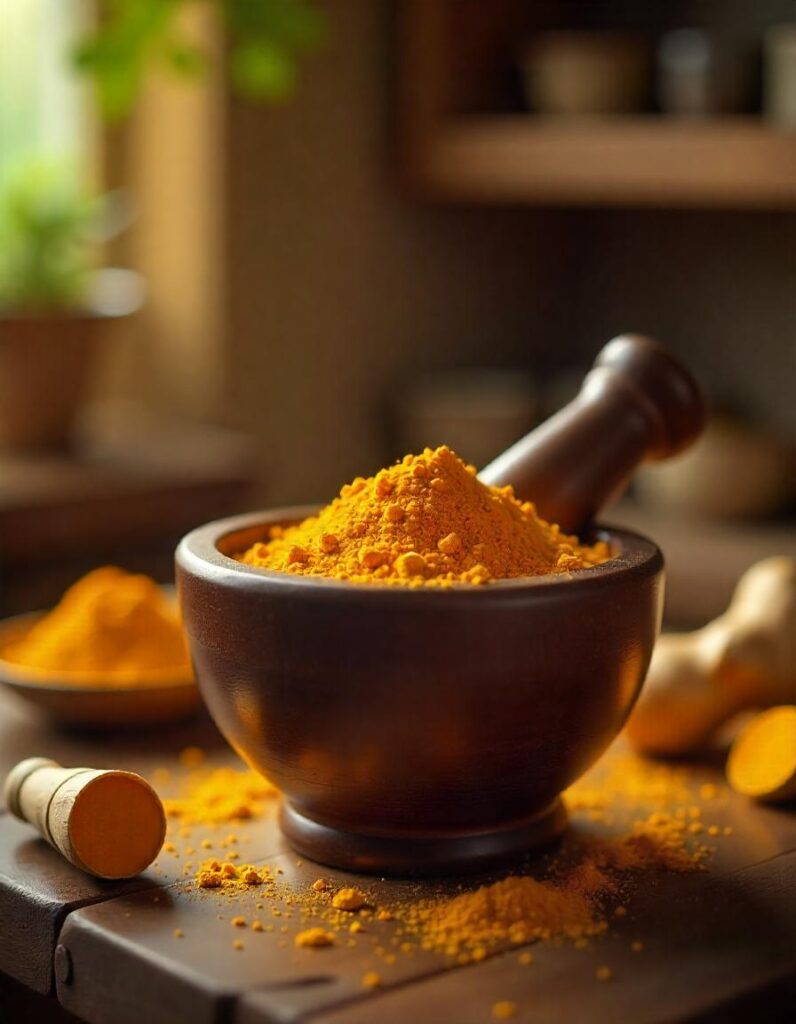Joint pain is a common issue affecting millions worldwide, often leading people to rely on over-the-counter (OTC) medications for relief. Over-the-counter joint pain relievers offer quick relief, but they often come with side effects like stomach issues or long-term risks. You’re not alone if you’re searching for safer, natural ways to ease joint pain. This guide explores effective natural alternatives to over-the-counter joint pain relievers, including herbal remedies, dietary supplements, and lifestyle changes to promote joint health and long-term mobility.

Joint pain can result from various conditions, including osteoarthritis, rheumatoid arthritis, and injury-related inflammation. Chronic joint pain can affect mobility, making daily tasks difficult. Additionally, joint pain may develop due to aging, autoimmune diseases, or repetitive strain from physical activity.
Related: Joint Pain Triggers to Avoid: If Your Lifestyle Harms Your Joints
Risks of Over-the-Counter Pain Relievers
While OTC pain relievers like NSAIDs provide quick relief, they may cause stomach issues, liver damage, and other side effects when used long-term. This has led many individuals to explore natural remedies for joint pain relief as a safer alternative. Certain pain relievers can also increase the risk of cardiovascular issues or kidney problems, making it important to seek alternative treatments.
Benefits of Natural Joint Pain Relief
Natural remedies focus on reducing inflammation, improving joint function, and providing pain relief without the risks associated with OTC medications. Many of these remedies come from herbal sources and dietary changes, offering holistic benefits. Additionally, they contribute to overall health, improving digestion, immunity, and cardiovascular function.
Related: What to do before taking painkillers to reduce arthritis pain
Best Natural Remedies for Joint Pain Relief
1. Herbal Alternatives to OTC Pain Relievers
Several herbal alternatives have been found effective in managing joint pain and inflammation.

Turmeric and Curcumin
Turmeric is a golden-yellow spice widely used in cooking and traditional medicine. Its active ingredient, curcumin, has powerful anti-inflammatory and antioxidant properties.
- Curcumin blocks certain enzymes and molecules that cause inflammation, which can alleviate joint pain and swelling.
- Studies show that curcumin may be as effective as NSAIDs (like ibuprofen) without the harmful side effects.
How to Use:
- Take turmeric supplements containing at least 95% curcuminoids (400-600 mg daily).
- Add turmeric powder to soups, smoothies, or teas for daily intake.
- Combine turmeric with black pepper to enhance curcumin absorption.
Boswellia (Indian Frankincense)
Boswellia is an herbal extract derived from the resin of the Boswellia tree. It has been used for centuries in Ayurvedic medicine for its anti-inflammatory properties. It is often recommended for people seeking herbal alternatives to NSAIDs for joint pain. Many individuals find Boswellia helpful for managing symptoms of osteoarthritis and rheumatoid arthritis.
- Reduces the production of inflammatory compounds in the body.
- It helps improve joint mobility and reduce stiffness, especially in arthritis patients.
How to Use:
- Take Boswellia supplements containing 300-500 mg of standardized extract (with at least 60% boswellic acids) two to three times daily.
- Look for supplements labeled as “Boswellia serrata” for optimal benefits.
Ginger for Inflammation
Ginger is a natural anti-inflammatory powerhouse that can help reduce joint pain and swelling.
- Contains gingerols and shogaols, compounds that block inflammation pathways.
- Regular consumption can help reduce joint inflammation naturally in osteoarthritis and rheumatoid arthritis.
How to Use:
- Drink ginger tea made by steeping fresh ginger slices in hot water for 10 minutes.
- Add fresh or powdered ginger to meals or smoothies.
- Take ginger supplements (500-1000 mg daily) if dietary intake is insufficient.
2. Dietary Supplements for Joint Health
Glucosamine and Chondroitin
Glucosamine and chondroitin are naturally found in cartilage and are essential for joint health.
- Support the repair of cartilage and prevent further deterioration.
- Help alleviate joint pain and improve mobility, particularly in osteoarthritis patients.
How to Use:
- Take supplements containing 1500 mg of glucosamine and 1200 mg of chondroitin daily.
- Look for products labeled as sulfate forms, which are better absorbed by the body.
Omega-3 Fatty Acids
Omega-3s are healthy fats found in certain fish oils and plant-based foods flaxseeds that have potent anti-inflammatory effects.
- Reduce the production of inflammatory chemicals in the body.
- Improve morning stiffness and reduce joint pain in conditions like rheumatoid arthritis.
How to Use:
- Consume fatty fish like salmon, mackerel, and sardines at least twice a week.
- Take fish oil supplements containing at least 1000 mg of combined EPA and DHA daily.
- Include plant-based sources like flaxseeds, chia seeds, and walnuts in your diet.
Collagen for Joint Support
Collagen is a structural protein that helps maintain cartilage, the tissue that cushions joints.
- Supports cartilage repair and reduces joint stiffness.
- Helps maintain overall joint flexibility and comfort.
How to Use:
- Take hydrolyzed collagen supplements (5–10 grams daily) for better absorption.
- Mix collagen powder into smoothies, coffee, or soups.
3. Essential Oils and Topical Treatments
Essential oils like eucalyptus and peppermint provide natural painkillers for arthritis relief by reducing inflammation and soothing sore joints when applied topically.
- Eucalyptus and peppermint essential oils have cooling and anti-inflammatory properties.
- Topical applications improve blood flow and reduce pain perception.
How to Use:
- Applying diluted essential oils with carrier oil (like coconut oil) and massage directly to the affected area can offer targeted relief from stiffness and discomfort.
- Look for creams containing menthol or capsaicin for additional relief.
4. Anti-Inflammatory Foods to Include in Your Diet

What you eat can have a significant impact on joint inflammation and overall health. A diet rich in antioxidant foods can reduce inflammation in the body, protecting joints and improving symptoms of arthritis.
Related: Top Anti-Inflammatory Foods for Joint Pain
Foods to Include:
- Berries: Rich in antioxidants that reduce inflammation.
- Leafy Greens: Kale, spinach, and Swiss chard contain vitamins that protect joints.
- Nuts and Seeds: almonds, flaxseeds, and chia seeds provide healthy fats.
- Olive Oil: A great alternative to inflammatory vegetable oils.
- Spices: Adding spices like turmeric and ginger can further enhance anti-inflammatory benefits.
Lifestyle Changes to Support Joint Health
Low-Impact Exercises for Joint Pain Relief
Physical activity strengthens muscles around joints, improving flexibility and reducing strain.
- Enhance joint function and prevent stiffness.
- Strengthen surrounding muscles to better support the joints.
Suggested Exercises are:
- Swimming: Gentle on joints while building strength.
- Yoga: Improves flexibility and balance.
- Walking: boosts blood flow to joints and strengthens muscles.
- Tai Chi: Combines gentle movements with mindfulness to reduce joint pain.

Weight Management
Maintaining a healthy weight is crucial in reducing stress on weight-bearing joints. Losing even a few pounds can significantly alleviate knee and hip pain. A balanced diet and regular exercise can help manage weight effectively.
Tips to Follow:
- Follow a balanced diet rich in lean proteins, healthy fats, and whole grains.
- Gradually lose weight if needed through a combination of diet and low-impact exercise.
Importance of Hydration and Joint Lubrication
Drinking enough water helps maintain the lubrication of joints, preventing stiffness and discomfort. Hydration also plays a role in flushing toxins from the body that may contribute to inflammation.
Comparing Natural and OTC Joint Pain Relievers
- While OTC medications offer immediate relief, natural alternatives focus on long-term healing by reducing inflammation and supporting joint function. Although natural remedies may take longer to show effects, they address the root cause of pain rather than just masking symptoms.
- Natural remedies are generally safe but may interact with certain medications. Consulting a healthcare provider before starting any new supplement is essential. Some herbal remedies can have mild side effects, such as digestive discomfort, so it is best to start with small doses.
How to Choose the Right Natural Remedy for You
Consider factors like the severity of joint pain, lifestyle habits, and any underlying medical conditions before choosing a remedy. Additionally, consistency is key—most natural treatments require regular use for noticeable results.
When to Consult a Doctor
If joint pain persists despite natural treatments, consulting a healthcare professional is advised to rule out underlying conditions. Chronic joint pain may indicate a more serious issue that requires medical intervention.
Conclusion: Taking a Holistic Approach to Joint Pain Relief
By incorporating daily habits to relieve joint pain naturally, such as dietary changes, herbal supplements, and exercise, individuals can manage their symptoms effectively. While natural alternatives to over-the-counter joint pain relievers may take time to show results, they provide a sustainable and safer approach to joint health. A combination of lifestyle adjustments, proper nutrition, and herbal treatments can contribute to long-term joint mobility and comfort.
Would you consider trying any of these remedies? Exploring a holistic approach to joint pain relief could be the key to long-term wellness and mobility.